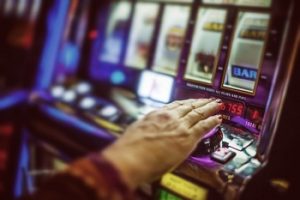Could My Loved One Have a Gambling Disorder?
Could My Loved One Have a Gambling Disorder?
March is Problem Gambling Awareness Month. Sponsored by the National Council on Problem Gambling (NCPG), this recognition week seeks to educate the public about gambling addiction, and help that is available.
Problem gambling—also referred to as gambling disorders or gambling addiction—happen when a person becomes obsessed with gambling and has an uncontrollable urge to keep gambling. The NCPG says these are signs that a person might have a gambling problem:
- Preoccupied with gambling and unable to stop
- Bragging about gambling, exaggerating wins and minimizing losses
- Gambling in hopes of winning back what they have lost
- Borrowing money for gambling
- Restless and irritable when not gambling
- Lying to hide time spent gambling or unpaid debts
- Doing something illegal to get money for gambling
- Jeopardizing a significant relationship or job by gambling
Gambling is a huge industry in the U.S. Americans spend more on casino gambling, sports gambling, lotteries, bingo, pull tabs and internet gambling than they do on music, sporting events and movies combined. And statistics show that older adults are the fastest growing group of gamblers.
Seniors enjoy bingo, racetrack betting, and casino gambling, especially slot machines and video poker (though fewer are taking part in in-person gambling during the pandemic). Older gamblers can be big business for casinos. They set aside many disabled parking spaces in their parking lots. “Retirement-aged consumers are an especially desirable demographic for the gaming industry because they fill the floors during off-peak hours,” reports the AARP. “Casinos market to them aggressively, offering discounted meals, ‘Golden Oldies’ entertainment shows, and complimentary shuttle service—on days when Social Security checks arrive.”
Fewer older adults were going to casinos during the pandemic, but social distancing brought its own problems. “While in the past, gambling largely took place in establishments such as betting shops or casinos, it has now become much easier to access in secret, particularly on smartphones and computers,” reported University of Cambridge psychiatry professor Barbara Sahakian. “In short, it’s no longer necessary to leave your home to gamble.”
Is it “social gambling,” or gambling addiction?
For many seniors, gambling is harmless entertainment. They hop on the casino shuttle, socialize with others and casino staff, bet a few dollars and take advantage of senior discounts on meals, drinks and perhaps a show. They’ve set aside part of their entertainment budget for gambling, and they stop when they reach their limit.
But some older adults develop a gambling problem that seriously impacts their financial well-being. Boredom, isolation, depression and cognitive impairment can affect judgment and make it harder for older gamblers to stick to their limit. Seniors on a fixed income—who can little afford to gamble away their money—might hope that they will “strike it rich” and improve their financial situation. Family may notice that their loved one has withdrawn from the activities they used to enjoy. Possessions may have disappeared from their loved one’s home, their loved one being vague about what happened. A senior may be eating poorly, living an almost totally sedentary life, and neglecting their medical care and personal needs.
How can family help?
You can’t intervene merely because you don’t approve of gambling, or you think Mom should spend her entertainment money somewhere else; instead, the first step is to get an accurate idea of the extent of your loved one’s gambling. Urge your loved one to be evaluated by their doctor and to get a medication review. A new or accelerating gambling disorder could be a sign of early Alzheimer’s disease or other dementia, and certain prescription drugs are linked to confusion and lessened impulse control.
Having a conversation about problem gambling can be difficult. Assure your loved one that you have their best interests in mind, and that you want to help, not judge. It can also be helpful to assist your loved one in finding other ways to fill their time. Instead of going to the casino or gambling online, your loved one might find mental stimulation and companionship through a senior recreation program, volunteer service or taking a class. Non-gambling computer games can offer brain exercise and sometimes socialization—even with the grandkids. Help your loved one locate opportunities to be physically active and socially connected.
If your loved one resists your help, or expresses the desire to stop gambling yet can’t break the habit, encourage them to talk to a professional. Treatment is available for gambling addiction and includes cognitive therapy and support groups. An aging life care professional (also known as a geriatric care manger) can help assess the problem. Your loved one’s financial manager or an elder law attorney can look at your loved one’s situation and advise you if it’s time to step in and help your loved one manage their money.
Source: IlluminAge AgeWise
![Guiding Care [logo]](https://www.guidingcarefl.com/wp-content/uploads/sites/361/2021/05/logo.png)
